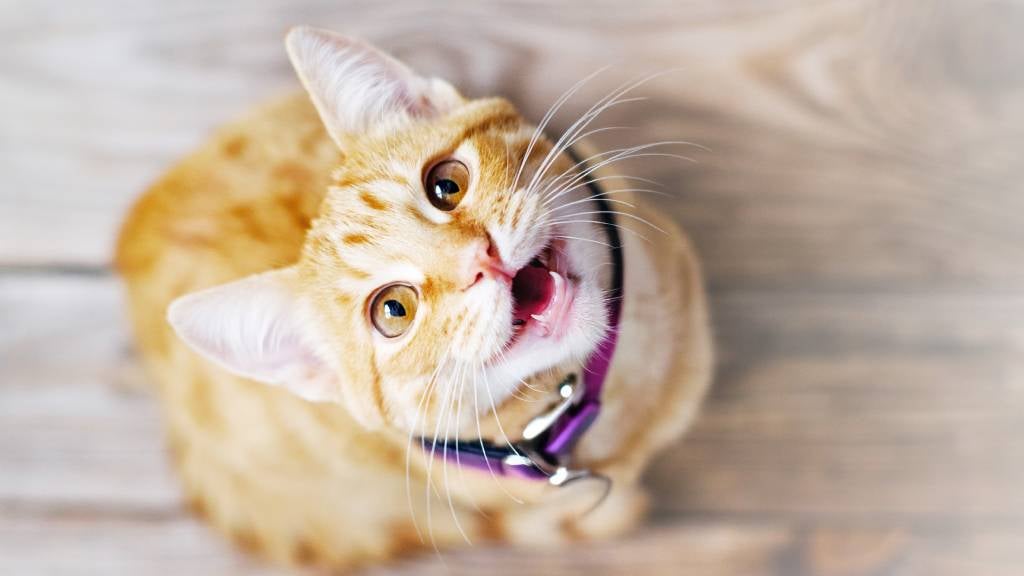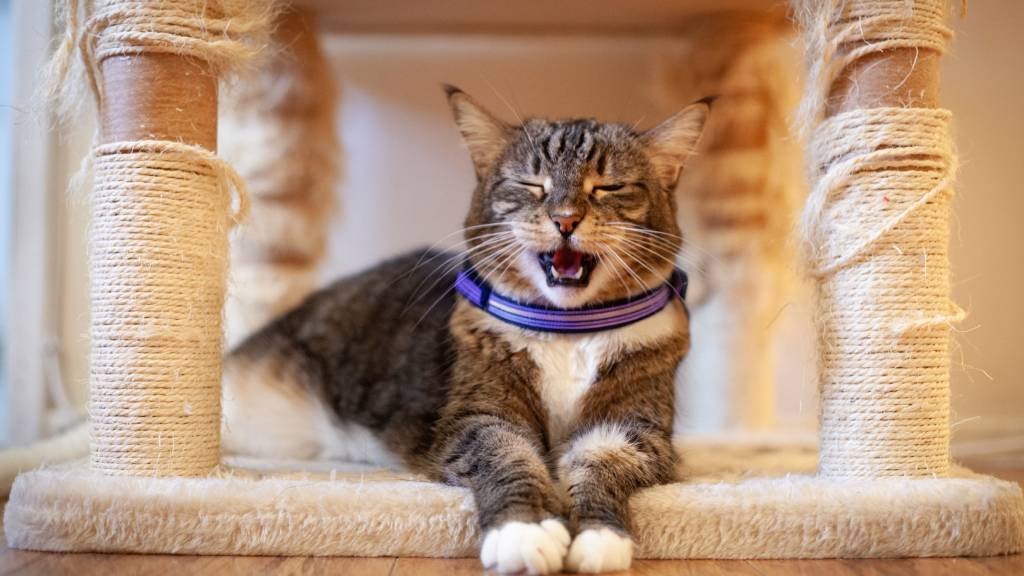What does your cat’s meow mean

Unlike dogs or humans, our feline whānau use a subtle mix of body language, scent, and soft vocalisations to express themselves within their species. But when it comes to communicating with their favourite humans? That’s where the cat meow or cat noise comes into play.
Meowing is a unique behaviour cats reserve almost exclusively for us. While adult cats rarely meow at each other, they’ve cleverly adapted this kitten-like sound to kōrero with their caregivers. As Dr. Emma Ruck BVSc (Dist) MANZCVS explains, “Cats meow to communicate with humans – this is something they have retained from kittenhood during the process of domestication.”
We might be used to barking dogs and chatty toddlers, but learning to decode your cat’s meow is a powerful way to connect and care for them better.
The purpose of the meow: What my cat is really saying
Whether your cat greets you at the door or vocalises from another room, every meow has meaning. Cats may meow to:
- Say hello
- Ask for food, play or attention
- Show frustration or fear
- Indicate pain or discomfort
Dr Emma notes that domestic cats have even evolved to produce higher-pitched, more pleasant-sounding meows than their wild cousins, proof of just how closely they’ve adapted to life alongside humans. Some studies suggest cats can tweak the tone, pitch, and length of their meows based on what gets the best response from their humans.
If you’ve ever felt like your cat was “training you,” you might be right.
Why does my cat meow when they see me?
If your cat chirps, meows, or rubs up against you the moment you walk in the door, it’s not random. It’s a greeting behaviour and a sign they’ve bonded with you and feel safe.
Like any behaviour that gets reinforced with a pat, a cuddle, or a meal, this kind of meowing becomes a positive feedback loop. Dr Emma explains: “Receiving affection, food or play in return increases the likelihood of this behaviour to be repeated.”
In short, your cat meows when they see you because they like you. And they’ve figured out that it works.

Common cat meow sounds
Not all meows are created equal. Cats have a vocal range that can express excitement, frustration, and everything in between. Here are some common feline sounds and what they might mean as outlined by Dr. Ruck:
- Trills and chirrups: These friendly, social sounds are often used to say “hi” or grab your attention. A trill may come out without them even opening their mouth, while chirrups are often used by mother cats to call their kittens, so if your adult cat uses them on you, take it as a compliment.
- Standard meow: This is your everyday “I want something” meow aka a short meow – but what do short meows mean? It’s medium-pitched and usually means they’re asking for food, attention, or a door to be opened.
- Long, drawn-out meow: This one usually spells urgency or frustration. It might be the “why is dinner late?” meow or a sign that they’re trying to get your attention for something important.
- High-pitched mewl: Often used as a greeting, this soft and high-pitched meow may come with head-butting or leg-rubbing, your cat’s way of giving you a warm welcome.
- Repeated meows: A rapid series of meows can signal excitement, especially when your cat knows something good is about to happen (like playtime or kai).
- Sudden, high-pitched meow: This usually indicates discomfort or surprise, like when they accidentally step on something sharp or get spooked.
- Low-pitched growl or meow: Sometimes, cats do this when they are playing but it can also be a warning sign that they are annoyed or unhappy. Time to give them some space or risk a warning snap or swipe.
When meowing becomes excessive
Some cats, especially certain breeds like Siamese or other Oriental types, are naturally more vocal. But even outside breed traits, meowing can become a learned behaviour reinforced by our responses.
For example, if your cat meows persistently at 4am and you eventually cave and feed them, you’ve (accidentally) taught them that early-morning meowing equals food. As Dr. Ruck points out, “Meowing may be reinforced when the cat is seeking the pet parent’s attention via vocalising and they talk back to the cat, providing them with attention in return.”
Here are a few tips for managing excessive meowing:
- Use an automatic feeder to avoid night-time wakeups
- Give attention when your cat is calm and quiet, rather than when they’re meowing
- Create a rich environment with toys and stimulation to reduce boredom-based meowing
- Keep your cat out of the bedroom at night if sleep disruption becomes a problem
- Play with your cat and feed them before bedtime
When to contact a vet
While some meowing is normal (and even cute), a sudden increase in vocalisation can indicate something’s wrong, especially in adult or senior cats.
Medical conditions that may cause excessive meowing include:
- Signs of pain (dental, musculoskeletal, urinary, or gut-related)
- Hyperthyroidism
- Cognitive dysfunction
- Sensory decline (like hearing loss)
- Stress or anxiety
- Separation distress or noise phobia
- Oestrus (heat) in non-desexed females
According to Dr. Ruck, if your cat develops a new pattern of excessive vocalisation, especially paired with other changes in behaviour or health, it’s important to seek veterinary advice. “A thorough physical work-up may include blood tests, blood pressure checks, urinalysis, and other diagnostics to identify the cause.”
Early detection makes a big difference, especially with conditions like hyperthyroidism or arthritis that can be well managed with the right treatment.
Final word: Meow is a conversation
Your cat’s meow isn’t just background noise; rather, it’s their way of reaching out to you. Whether they’re asking for kai, a cuddle, or a bit of space, every meow tells a story. The more you learn to listen and observe, the deeper your connection will grow.
And if your cat’s behaviour shifts or something doesn’t feel right, your vet is always your best first port of call, and with SPCA Pet Insurance you’ll know you cat’s meows for attention won’t go unheard.
30 Oct 2025
